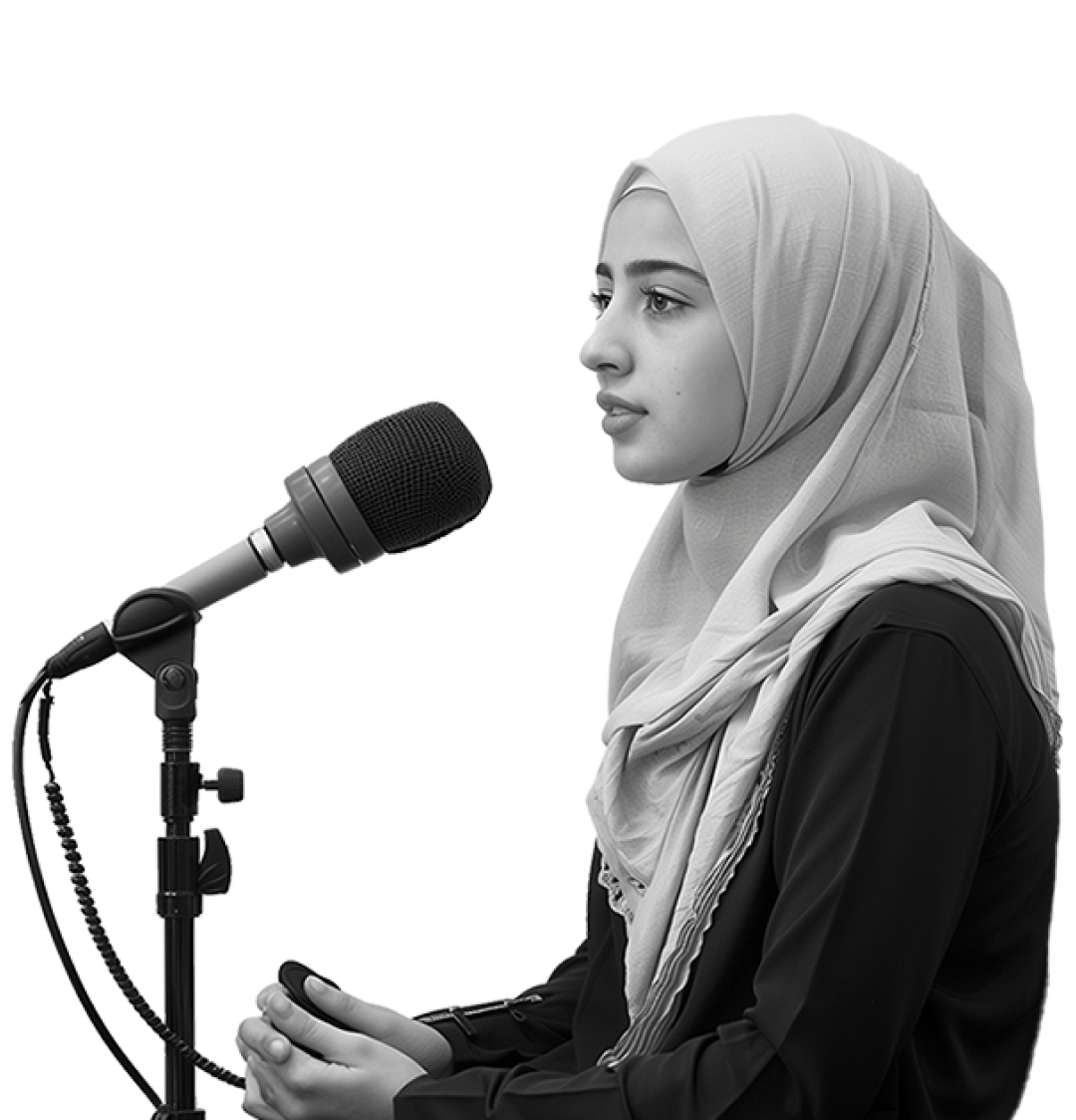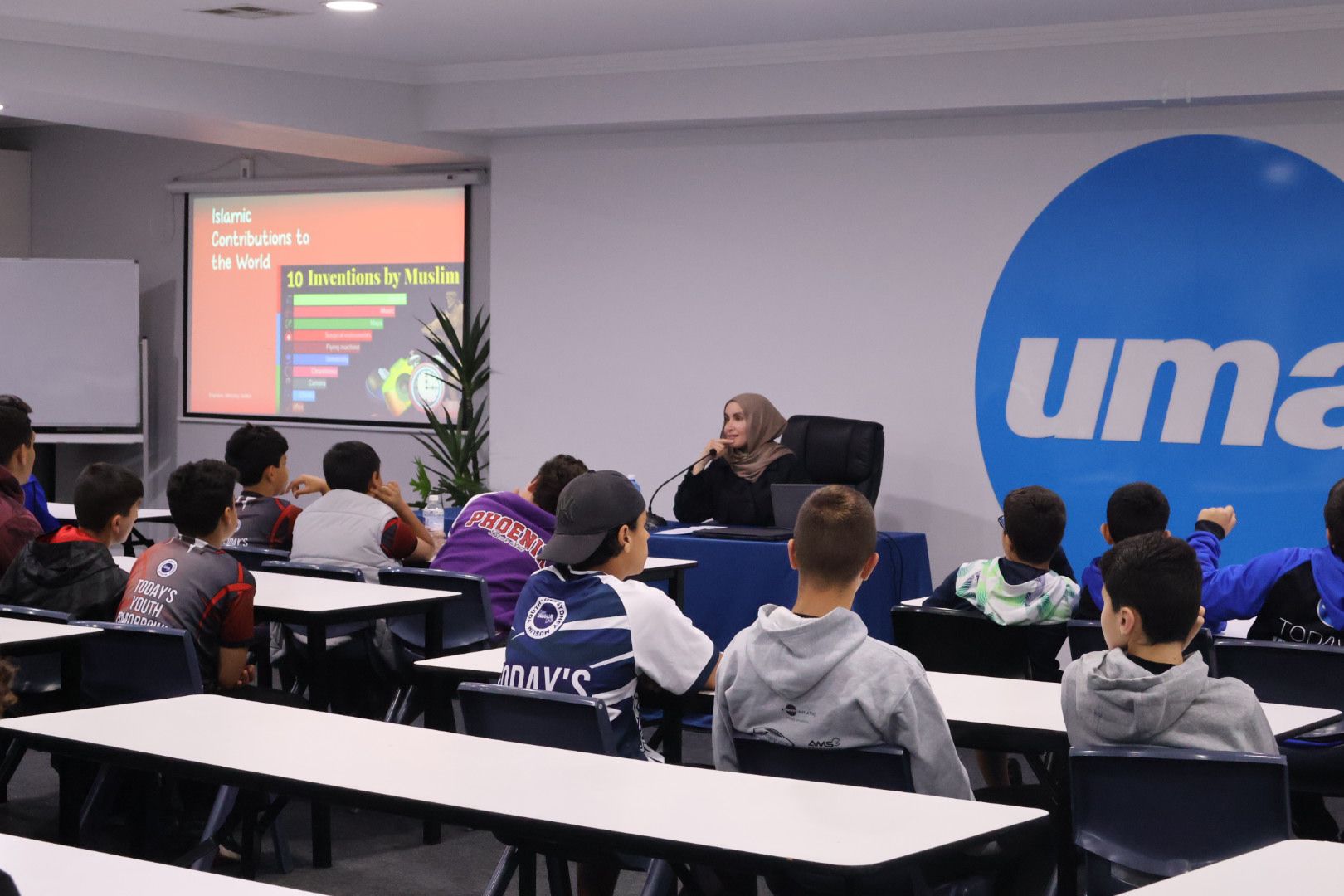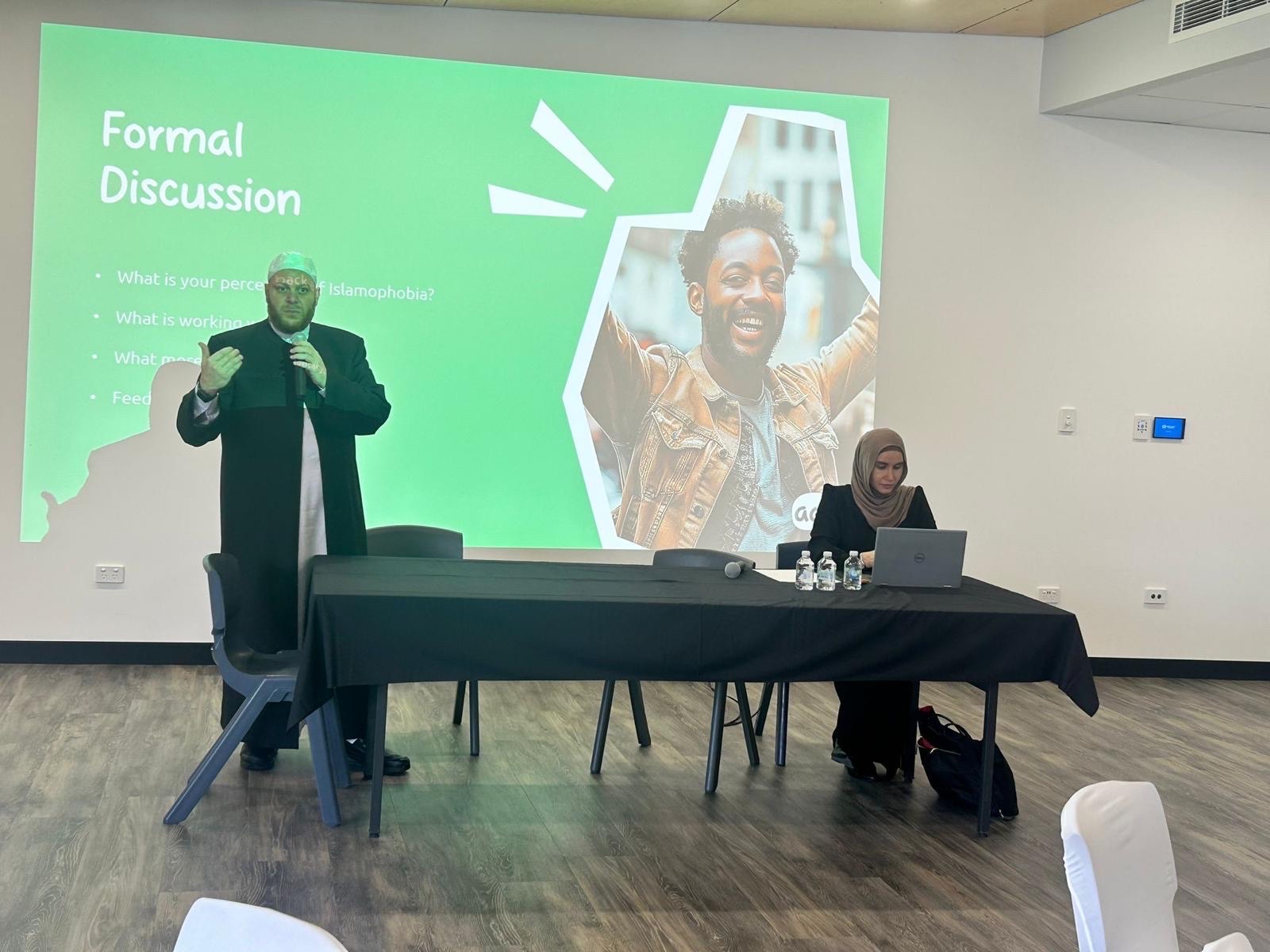
Fighting Islamophobia Together
It is crucial to fight against all forms of hate, racism, discrimination, and prejudice wherever it occurs across Australia, as a united community. Reporting incidents of Islamophobia not only helps victims seek justice, but it also raises awareness about the prevalence and severity of these incidents nationally. By reporting, we contribute to the collection of accurate data, which is vital for shaping informed policy decisions and creating targeted strategies to combat anti-Muslim, anti-Arab, and anti-Palestinian racism.
Palestine & Gaza
While people of all faiths and backgrounds empathise with the long-standing struggles of the Palestinian people, it has become increasingly difficult for advocates of Palestinian human rights (especially Muslim and Arab voices) to voice their opposition to Israel’s war on Gaza, particularly since 7 October. These individuals frequently face baseless allegations of antisemitism, and mainstream media often echoes these harmful and unsubstantiated claims without question. By linking the Palestinian struggle with to Islamophobic statements and assumptions, these prejudices work together to justify oppression, violence, and the silencing of voices that advocate for justice and equality.
Hijab
In Australia, the hijab, a symbol of a Muslim woman's faith, empowerment and religious identity, has become highly politicised, especially in debates around the niqab/burka, often framed as a security or cultural issue. Consequently, Muslim women wearing the hijab have been targeted in violent attacks, including incidents where headscarves have been forcibly removed and victims verbally and physically assaulted. This politicisation not only impacts their personal safety and religious freedom but also reinforces broader anti-Muslim discrimination and the structural marginalisation of the community.
Protecting Human Rights
Islamophobia in Australia poses a serious challenge to the protection of human rights, as it leads to discrimination, harassment, and violence against Muslim communities. These actions undermine the core universal principles of equality and dignity that are fundamental to human rights.
Work Harrassment
Islamophobia has no place in the workplace. Islamophobia at work happens when a person or group of people repeatedly behave unreasonably towards a person that follows Islam. Direct discrimination happens when a person is treated less favourably than another person in a similar situation because of their religion. Indirect discrimination can be less obvious. It can happen when employers or service providers put in place conditions, requirements or practices which appear to treat everyone the same, but which disadvantage some people because of their religion. Direct and Indirect discrimination against Muslim workers in workplaces is a form of Islamophobia.
Direct forms of islamophobia may include the following:
- Mocking Muslim Identity: Making fun of colleagues using words that mock their Muslim identity.
- Assumptions Based on Attire: Assuming a Muslim colleague wearing a hijab is radicalised or an extremist
- Name-Calling and Stereotyping: Constantly labelling a Middle Eastern employee as a “terrorist” by managers and co-workers
Indirect forms of islamophobia may include the following:
- Religious Accommodations: Complaining about Muslim colleagues adjusting their hours during Ramadan
- Exclusion: Excluding colleagues from social gatherings based on religious practices can be seen as harassment and impact working relationships
For more information, please see our legal guide on “Islamophobia in the Workplace”
War on Terror
Since 9/11, Islamophobia became more widespread and deeply entrenched, infringing on the fundamental rights and freedoms of Muslims worldwide. This surge in anti-Muslim hatred carried the hallmarks of an imperialist mindset, with entire systems and narratives designed to marginalise and vilify Muslims. Disturbingly, this wasn’t just a social or cultural issue; state-sponsored Islamophobia became a stark reality, creating an environment where prejudice was legitimised and discrimination institutionalised on a global scale.
The War on Terror and anti-terrorism policies had a profound impact on Muslim communities in Australia, leading to increased surveillance, discrimination, and social stigmatisation. These policies, often framed around national security, disproportionately targeted Muslims, reinforcing stereotypes that equated Islam with violent extremism. As a result, many Muslim Australians experienced heightened scrutiny from law enforcement and government agencies, as well as a surge in Islamophobia within the broader public. The fear and mistrust generated by these policies not only undermined the sense of belonging and safety for Muslim communities but also fuelled a climate of hostility and exclusion, making it harder for them to fully participate in society without facing prejudice or suspicion.
Online and Social Media Harrassment
Islamophobia is not confined to physical spaces; it has permeated the digital world as well. Online spaces, such as social media platforms, forums, and comment sections of news articles, have become arenas for Islamophobic behaviour. This can take the form of hate speech, derogatory comments, threats, or the spreading of harmful stereotypes about Muslims. For example, an increasing number of Muslims who speak out about the severe dehumanisation of Palestinians are being targeted online, with their ongoing employment being threatened. This creates a chilling effect that silences and censors the community and limits the community’s ability to voice concerns without fear of repercussions. Misinformation and fake news targeting Muslims can be disseminated rapidly online, leading to widespread prejudice and discrimination.
Cyberbullying targeting Muslims, particularly young people, is also a significant concern. The anonymity provided by the internet often emboldens individuals to express Islamophobic and discriminatory sentiments they might not express in person. It’s crucial to promote digital literacy and online etiquette to combat this form of Islamophobic discrimination and ensure that online spaces are safe and respectful for all users.
Report an Incident
If you have experienced or witnessed an incident of islamophobia, extremism, bias, bigotry or hate, please report it using the incident form below. We will work to assess your situation and respond as quickly as possible. Any personal information provided will be kept strictly confidential. If this is an emergency, please dial 000.
Click here to make the report
Report The Incident
Select incident type*
Type of Application*
Contact Details*
Name:*
Preferred Method of Contact*
If we need to contact you about this report, how would you prefer we do that?
What was the specific nature of the incident?* (You may select more than one option)
How were you involved in the incident?*
Has this happened to you before? *
What was the specific nature of the incident?* (You may select more than one option)
Online Platform*
Social media account name of perpetrator or URL address link about the incident*
Date of Incident*
Please give us as much information as you can about the victim so we can contact them and make sure they get the support they need.
Victims Name: *
Please give us an estimate of their age*
Gender*
Was the victim wearing any cultural or religious clothing or did they have other religious features (e.g. long beard) at the time of the incident?*
Please provide details*
What is your relationship to them?
What's their ethnic background?*
How can we assist you? (You may select more than one option)
When did the incident happen?*
What time did the incident happen?*
Location:*
Description about the Incident:*
Please give as much detail as possible including what happened and what the perpetrator said and did.
Or record your voice message
Do you have any evidence of the incident such as photos, screenshots, video?
*You can upload multiple files (maximum 10).Were you or anyone else injured in the incident?*
Please check all your information is correct before you submit the form.
Select incident type*
Type of Application*
Contact Details*
Name:*
Preferred Method of Contact*
If we need to contact you about this report, how would you prefer we do that?
What was the specific nature of the incident?* (You may select more than one option)
Online Platform*
Social media account name of perpetrator or URL address link about the incident*
Date of Incident*
How can we assist you? (You may select more than one option)
How many perpetrators were there?*
Suspect 1
Description of perpetrator
Gender*
Please give us an estimate of their age*
What's their ethnic background?*
Describe the perpetrator (include information like height, weight, any distinguishing features such as tattoos, beard, etc)*
How did the incident make you feel?* (You may select more than one option)
Have you reported to*
Do you want us to forward your report to the Police?
How can we assist you? (You may select more than one option)
Please check all your information is correct before you submit the form.
Select incident type*
Type of Application
Contact Details*
Name:*
Preferred Method of Contact*
If we need to contact you about this report, how would you prefer we do that?
What was the specific nature of the incident?* (You may select more than one option)
How were you involved in the incident?*
Has this happened to you before? *
Please give us as much information as you can about the victim so we can contact them and make sure they get the support they need.
Victims Name: *
Please give us an estimate of their age*
Gender*
Was the victim wearing any cultural or religious clothing or did they have other religious features (e.g. long beard) at the time of the incident?*
Please provide details*
What is your relationship to them?
What's their ethnic background?*
When did the incident happen? *
What time did the incident happen?
Location*
Description about the Incident:*
Please give as much detail as possible including what happened and what the perpetrator said and did.
Or record your voice message
Do you have any evidence of the incident such as photos, screenshots, video?
Were you or anyone else injured in the incident?
How many perpetrators were there?
Suspect 1
Description of perpetrator
Gender*
Please give us an estimate of their age*
What's their ethnic background?*
Describe the perpetrator (include information like height, weight, any distinguishing features such as tattoos, beard, etc)*
How did the incident make you feel? – can select more than one
Have you reported to*
Do you want us to forward your report to the Police?
How can we assist you? (You may select more than one option)
How does AAI respond to these incidents?
When an incident is reported, a case manager reviews the incident for completeness and level of urgency. If additional information or verification is needed, AAI will contact you with recommended actions and, if necessary, provide referrals for legal or mental health support services. If the incident is reported as a hate crime or hate incident, further support can be provided to escalate the case to the relevant authorities.


Combating Islamophobia in Australia


Once you submit your report, you will receive an automated reply from our system administrator. The incident will then be assessed through a three-step process: initial review, take action, and provide support.
Evaluate The Incident
Our experts will review the incident to detemine how AAI may be able to assist.
Determine Actionable Steps
AAI will determine any reasonable and appropriate actions that may be taken to mitigate the harm being experienced or witnessed.
Contact and Support You
AAI will reach out to you with recommended actions that you can take and may provide guidance.
Advocacy, Justice & Empowerment
Action Against Islamophobia is dedicated to supporting victims of Islamophobic incidents and addressing the many forms of Islamophobia in all its manifestations, including the growing tide of anti-Muslim, anti-Arab and anti-Palestinian sentiment in Australian politics and the media.

Latest News and Events
Stay up to date with the latest events, media updates and blogs posts.
|
Empowering Voices: Action Against Islamophobia, and ANIC initiative, hosted a youth forum with separate sessions for boys and girls to share their experiences on Islamophobia and how it appears in their lives. The overwhelming response from our young people was that it is important to standing up against Islamophobia and speak out against discrimination, negative […]
|
Empowering Voices: Action Against Islamophobia, and ANIC initiative, hosted a youth forum with separate sessions for boys and girls to share their experiences on Islamophobia and how it appears in their lives. The overwhelming response from our young people was that it is important to standing up against Islamophobia and speak out against discrimination, negative […]
|
The Australian National Imams Council (ANIC) recently held a pivotal forum in Queensland, hosted by the Islamic College of Brisbane, focused on addressing the impacts of Islamophobia and anti-Muslim sentiment affecting our communities, particularly over the past 11 months. This forum brought together esteemed Imams and Muslim community leaders from Queensland to collaboratively discuss this […]





